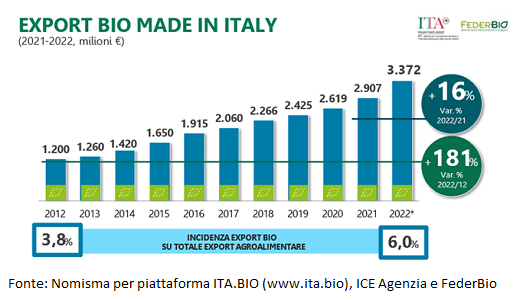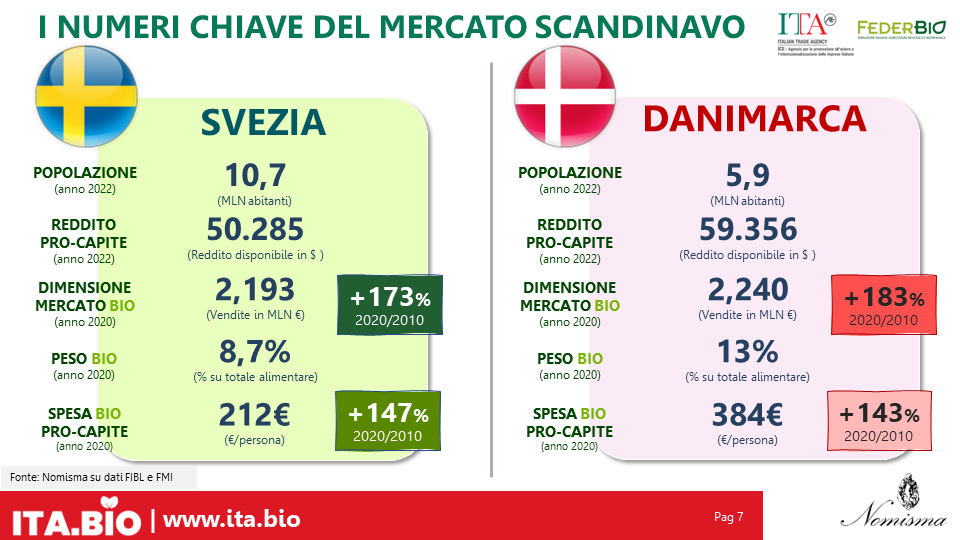Italian organic top quality for 4 out of 10 Scandinavian consumers

Pasta, extra virgin olive oil, cheese and wine the organic categories of interest for a market exceeding 4.4 billion euros. Italy market leader for organic wine in Sweden: 42% market share.
This is what emerges from Nomisma's analysis for the ITA.BIO Platform (www.ita.bio), the first Italian organic platform in the world promoted by ICE and Federbio, in the first focus dedicated to Scandinavia.
Denmark and Sweden, the world's eighth and ninth largest markets for sales of BIO products, with an increase of +183 percent and +176 percent, respectively, over the past 10 years and an organic penetration rate of 87 percent, are among the most promising markets for organic Made in Italy-as also confirmed by the panel of Italian food and wine companies interviewed by Nomisma.
This is the finding of the original Danish and Swedish consumer survey presented today at the fourth ITA.BIO forum.
The role of exports in organic made in Italy
The performance of organic agri-food exports is very positive: in 2022, sales of Italian organic agri-food products on international markets reached 3.4 billion euros, putting a +16% growth (year ending June) over the previous year.
What's more, the recognition of organic Made in Italy on international markets is also evidenced by the long-term growth (+181% compared to 2012, a value that has almost tripled) and by the export share on the Made in Italy basket, with a weight of 6% on the total Italian agri-food exports in 2022.
The bulk of exports concern food but the role of wine is also relevant.
The key organic numbers in Scandinavia
 All the numbers for organic in Scandinavia are positive. Denmark is the eighth largest market in the world in terms of value of domestic sales of organic products with 2,240 million euros and a share of organic sales in total food spending of as much as 13 percent (almost doubled since 2010). It is closely followed by Sweden - the world's ninth largest consumer of organic products - with a value of 2,193 million euros and an organic weight of nearly 9 percent. Not to mention per capita spending on organic products: 384 euros in Denmark and 212 euros in Sweden, making the two countries top the world rankings, in second and fifth place respectively.
All the numbers for organic in Scandinavia are positive. Denmark is the eighth largest market in the world in terms of value of domestic sales of organic products with 2,240 million euros and a share of organic sales in total food spending of as much as 13 percent (almost doubled since 2010). It is closely followed by Sweden - the world's ninth largest consumer of organic products - with a value of 2,193 million euros and an organic weight of nearly 9 percent. Not to mention per capita spending on organic products: 384 euros in Denmark and 212 euros in Sweden, making the two countries top the world rankings, in second and fifth place respectively.
The organic consumer in Scandinavia
Data from the original consumer survey conducted by Nomisma confirm strong interest in organic in Scandinavia: nearly 9 out of 10 households consumed an organic-branded food or beverage product during 2022. Other factors that make Scandinavia a high-potential market for organic include, on the one hand, the share of heavy users (40 percent of households buy organic in all or almost every expenditure) and, on the other hand, the centrality of the organic feature as a driver of choice, so much so that 1 in 5 consumers say they consider the organic brand as their first criterion of choice when buying food products, a share that increases for some product categories such as fresh fruit and vegetables, extra-virgin olive oil, baby food and cheese.
Nomisma's survey also shows that environmental and social sustainability is the main motivation of Scandinavian consumers behind their choice of organic products and involves nearly half of the users. Additional reasons driving organic purchases among consumers in Sweden and Denmark are health safety and different qualities and nutritional properties compared to conventional products.
The organic brand is not the only attribute that matters when choosing products to put in the shopping cart, and consumers demand consistency and sustainability across the board. Confirming this, as many as 28% of organic users consider it important that the packaging is eco-friendly or that the product was made in an environmentally friendly way (lower CO2 emissions, zero waste, use of renewable energy, etc.).
Organic made in Italy for the Scandinavian consumer
In international comparison, in the perception of Danish consumers, Italy ranks first among the countries that produce the highest quality organic products: 38 percent of organic users think so. In the case of Sweden, our country contends for the leadership with Denmark: in that case, the share of users who point to Italy when they think of the highest quality organic products is 37 percent.
Further confirming the excellent reputation of Italian organic food, for as many as 6 out of 10 Scandinavian consumers, Made in Italy organic food products have a higher quality than products from other countries, while for 7 out of 10 consumers, Italian organic food is also perceived higher on the front of guarantees of traceability and environmentally friendly production methods. Thanks to this excellent perception, Italian organic products find wide diffusion in Scandinavia: 65 percent of households bought an organic-branded Made in Italy food product during 2022 and 30 percent bought them at least once a week.
But what are the most promising products for organic Made in Italy?
Extra virgin olive oil, cheeses, tomato preserves, cured meats, cheeses, and wine are the Italian organic-branded products most purchased by Scandinavian consumers but also the categories for which consumers are most interested in the organic-Made in Italy combination.
The role of organic wine
The report presented by Nomisma also shows that wine is one of the most popular organic products in the Scandinavian market. If we focus on the Swedish market - based on data from Systembolaget, the Swedish monopoly that manages the sales of alcoholic beverages (including wine) - as much as a quarter of wine sales are precisely organic-branded wines worth 600 million euros in the latest survey. In this scenario, Italy is the absolute leader with a weight on total organic wine sales of 42 percent in both value and volume in 2021; a success to be attributed primarily to the excellent positioning of certain territories such as Veneto (thanks to Prosecco, which is the best-selling organic brand name in Sweden), Sicily and Puglia.
"Italian wine enjoys an excellent reputation in the Scandinavian market and Italy ranks first among the countries that produce the highest quality wines. This strong appreciation for Made in Italy wine is also reflected with reference to organic: as many as 38 percent of wine users drink organic-labeled wine of Italian origin and 20 percent do so on a weekly basis. And the opportunities for Italian wine companies are still ample in this important market, to the point that almost half of consumers would be interested in trying a new Italian wine with an organic brand while in a third of cases they would be willing to spend a price differential of more than 5 percent compared to a non-organic Italian wine," says Emanuele Di Faustino, Head of Industry, Services and Retail Nomisma S.p.A.
The potential of organic made in Italy
No obstacle for the combination of organic and Made in Italy in the future either: 30 percent of consumers say they are interested in buying an Italian food product with an organic brand, a share that rises to 46 percent when it comes to wine.
The undecided would be attracted not only by promotions and low prices, but also by famous brands, information on low environmental impact and the presence of eco-friendly packaging.
More than half of current non-wine users, in fact, have not yet tried Italian organic because they cannot find it in the assortment while in 1 in 5 cases they do not yet know its distinctive characteristics. The same reasons for non-purchase also apply to food products: 26 percent of those who do not consume organic Made in Italy food say they do not know its distinctive characteristics and, in 1 case out of 10, they do not find it in their regular outlets.
"In the last 10 years, Made in Italy organic exports have literally exploded (+181%), making Italy the leading exporter of organic food internationally after the USA. Scandinavian countries are markets where the demand for Made in Italy organic products is growing, products that combine attention to sustainability with the high quality of Italian agri-food production and incorporate cultural, social and environmental values recognized and appreciated worldwide. The ITA.BIO platform, born from the collaboration between the ICE Agency and FederBio with the support of the Ministry of Foreign Affairs and International Cooperation, intends to support companies first and foremost by providing information and knowledge of the markets that are essential to be able to operate there and by making available an integrated platform of promotional initiatives," says Paolo Carnemolla, FederBio Secretary General.

 Italiano
Italiano







